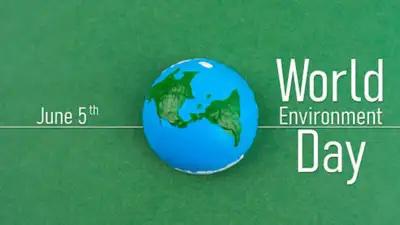- Home
World Environment Day 2025: Beat Plastic Pollution
June 5, 2025
As we mark World Environment Day 2025, the Institute of Green Growth Solutions (IGGS) joins millions around the globe in reflecting on the urgent and shared responsibility to protect an restore our planet. The environment is the very foundation of life, providing us with essential resources such as clean air, fertile soil, fresh water, and the rich biodiversity necessary to sustain agriculture, public health, and economic development. A healthy environment is a fundamental prerequisite for our survival and prosperity. In Ghana, where our forests, rivers, and coastlines face pressure from human activities and climate change, safeguarding the environment is both a moral duty and an urgent necessity.
Plastic pollution remains one of Ghana’s most existential environmental threats. According to the World Bank, Ghana generates approximately 1.1 million tonnes of plastic waste annually, with only 5% recycled. In urban centers like Accra and Kumasi, plastic waste blocks over 60% of drainage systems, significantly increasing flood risks during the rainy season. Research indicates that 73% of litter in public spaces such as markets, lorry stations, and streets comprises single- use plastics, including sachet water bags and polythene packaging, which can take over 400 years to degrade. In coastal and rural areas, over 200 tonnes of plastic waste are estimated to
enter water bodies like the Odaw, Densu, and Pra rivers each year, eventually polluting the Gulf of Guinea. This endangers marine biodiversity and undermines the livelihoods of over 10,000 fishing-dependent households. The scale of plastic pollution threatens ecosystems, public health, and national economic resilience.
Addressing this crisis requires rigorous action at every level: individual, community, and national. Individuals can contribute by reducing plastic consumption, opting for reusable bags, bottles, and containers instead of single-use items. Communities can play a critical role by organizing clean-up campaigns, promoting the separation of waste at the source, and supporting local recycling initiatives that help divert plastics from landfills and waterways.
The theme for this year’s World Environment Day, “Beat Plastic Pollution,” aligns closely with several United Nations Sustainable Development Goals (SDGs). It directly supports Goal 12: Responsible Consumption and Production by encouraging sustainable use of resources and waste reduction. It also advances Goal 14: Life Below Water and Goal 15: Life on Land by protecting marine and terrestrial ecosystems from pollution. Additionally, reducing plastic pollution contributes to Goal 3: Good Health and Well-being, by minimizing health risks associated with environmental contamination, and Goal 13: Climate Action, since plastic production and
disposal significantly contribute to greenhouse gas emissions. At IGGS, we recognize that achieving these interconnected goals demands coordinated efforts among governments, businesses, civil society, and the general public, alongside innovative solutions and widespread participation.
Call to Action
The dangers of plastic waste are real and an effective operationalization of Ghana’s waste management policy and strategy are needed. Essential steps to eliminate the plastic menace and foster sustainable development include:
- A call on the government to rigorously enforce a ban on single use plastics,
- Behavioral change on the use of plastics and choose alternatives
- Provision of incentives for the adoption of biodegradable alternatives
- Support green enterprises innovating in eco-friendly packaging solutions.
- Substantial investment in waste management infrastructure and a strategic shift towards a circular economy, where materials are reused and recycled continuously.
On this World Environment Day, the Institute of Green Growth Solutions call on all Ghanaians to renew their commitment to a cleaner, healthier, and more sustainable future. By working together to beat plastic pollution, we can protect our natural heritage, improve public health, and build a resilient Ghana that thrives for generations to come. The time to act is now, and every effort counts in safeguarding our planet for ourselves and future generations.

-
July 14, 2025
-
June 5, 2025
-
March 22, 2025
-
March 21, 2025
-
March 20, 2025
-
Oct. 1, 2025
6 a.m. - 6 p.m. -
Aug. 28, 2019
9 a.m. - 5 p.m. -
Aug. 23, 2018
8:30 a.m. -
Oct. 31, 2017
9 a.m. - 3 p.m. -
March 17, 2017
10 a.m. - 3 p.m.



